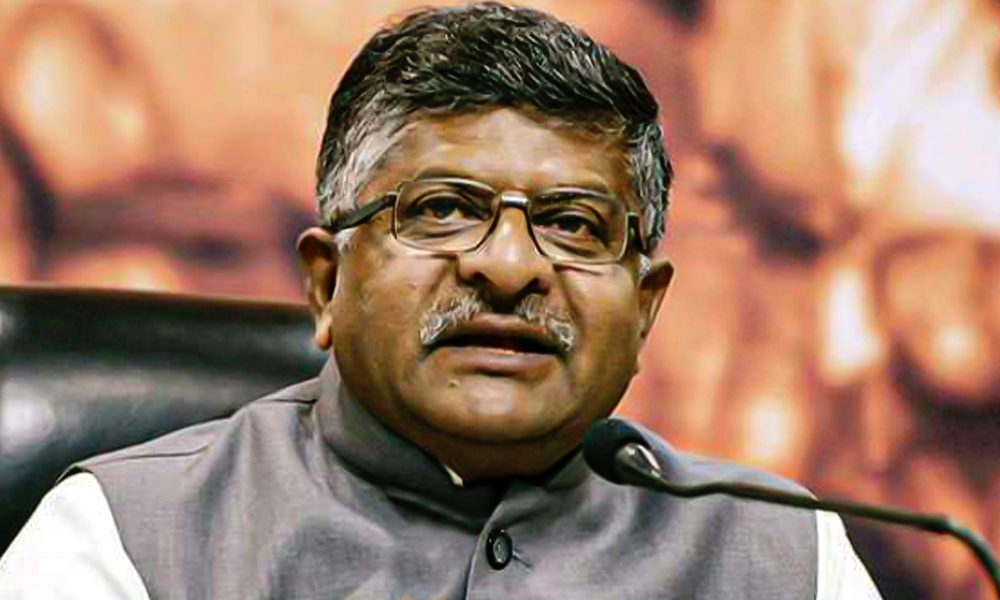
Image Credits: Dainik Jagran
'Internet Imperialism By Companies Unacceptable': Union Minister Ravi Shankar Prasad Defends New Digital Media Rules
Writer: Ritu Yadav
A journalism undergrad with experience in Reporting News, Content Writing and Public Speaking, Blogging. Skilled in Communication, Public Speaking, Management, Interpersonal skills and Leadership. Her interest involves writing about issues that generally go unnoticed, with a strong interest in politics and social welfare.
India, 8 March 2021 2:12 PM GMT
Editor : Shubhendu Deshmukh |
Shubhendu, the quint essential news junky, the man who loves science and politics in equal measure and offers the complete contrast to it by being a fan of urdu poetry as well.
Creatives : Abhishek M
" An engineer by profession, Abhishek is the creative producer of the team, graphic designing is his passion and travelling his get away. In more ways than one, he makes the content visually appealing."
The Union Information and Technology Minister said that new regulations were required to keep social media and other companies responsible for 'misuse and violence'.
Union Information Technology Minister Ravi Shankar Prasad on Sunday said the government would no longer accept "Internet Imperialism" by a "select few" technological giants of the world.
In an interview with The Indian Express, the minister stated that they would make sure that technological companies respect local ideas, culture, customs and sentiments.
"Any kind of internet imperialism by a select few is plainly unacceptable," Prasad said.
He hailed the internet's capability to empower people across the boundaries of the physical world and emphasised the need to respect the extraordinary evolution of internet democracy.
Prasad, while addressing the concerns regarding the latest digital media rules, said those who wanted to criticise and give "gyan" to the government would also have the "courage" to verify and mark themselves on social media sites so that their "genuineness" could be ascertained.
The minister said new rules are in the form of architecture that the intermediaries should voluntarily follow rather than the government mandating it through law.
While announcing these guidelines, the government had said that new regulations were required to keep social media and other companies responsible for "misuse and violence". The rules mandates platforms with more than 50 lakh users to set up stronger grievance redressal mechanisms and appoint executives to cooperate with law enforcement in India.
Defending the new regulations Prasad said, "Over the years, my department has been flooded with requests from victims, who said that their voices and concerns were not heard. We are not saying how you (the platforms) will dispose of (the complaints). In many cases, they can reject it also. But that is between the user and the intermediary. The government would not have a role in it."
The minister denied the introduction of rules without consultations with stakeholders and said there were extensive consultations before introducing new guidelines.
"The guidelines were framed after the matter has been engaged in the judiciary, including Supreme Court and many Parliamentary committees, apart from concerning civil societies," he added.
Following the introduction of the new guidelines, the Internet Freedom Foundation stated that the new regulations would probably entail "government control and more censorship."
Besides, DigiPub, a consortium of 11 digital-only news organisation, has also written to the Centre stating the laws "go against the fundamental principle of news and its role in a democracy".
The Indian National Congress had also criticised the proposed social media regulations, arguing that they were "non-statutory" guidelines that the government was trying to implement without the Parliament's approval.
The new guidelines were followed by a clash between the IT Ministry and global micro-blogging platform Twitter over blocking certain tweets and accounts that were allegedly promoting a fake and provocative hashtag in the backdrop of Republic Day violence during the 'Tractor March' by protesting farmers. On February 25, India issued rules to regulate social media companies, streaming platforms and digital news.
Read Also: Rajasthan: Sub-Inspector Rapes 26-Yr-Old Woman For Three Days In Police Station, Arrested
 All section
All section














